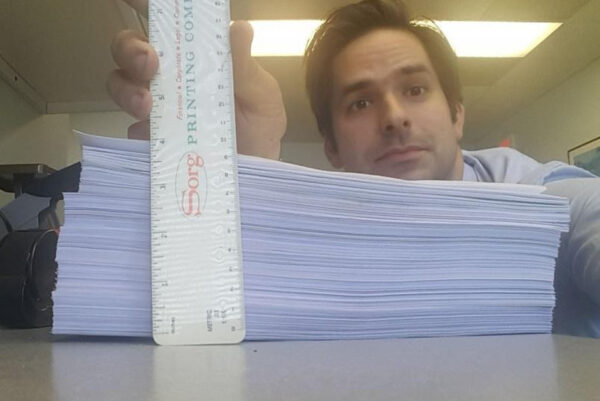This sponsored column is by James Montana, Esq., Doran Shemin, Esq. and Laura Lorenzo, Esq., practicing attorneys at Steelyard LLC, an immigration-focused law firm located in Arlington, Virginia. The legal information given here is general in nature. If you want legal advice, contact James for an appointment.
In this two-part series, we’re going to show you an asylum case from two perspectives: that of the client and that of her lawyer. Today, we’ll show you our point of view — how an asylum applicant walks in the door, how we develop the case and how we present it to the government. We’ve altered a few elements to protect the identity of our client (e.g., the country of origin), but we’ll certainly give you the essence of the case.

Mr. J.’s case began — as most of our cases do — with a phone call, a prior relationship and a referral. Our referral source told us that he had met Mr. J — a foreign official — and that Mr. J had been cut off by his home government, and Mr. J had a passel of children, and was there something we could do? Our answer to that question is always the same: We don’t know whether the law offers a solution, but it might, and we’d be happy to meet Mr. J for a consultation.
Mr. J came to our office with a rather unusual story. He had risen through the ranks of the security services in his home country of Azerbaijan, mostly engaged in counterterrorism and anti-corruption efforts. The United States, as part of its cooperative relationship with Azerbaijan, supports both counterterrorism and anti-corruption programs here, and so Mr. J had been selected from amongst his peers to attend advanced training in the United States. Over the course of a long career, Mr. J rose to become an important security official, working closely with the president of Azerbaijan.
Mr. J returned to the United States once more, sponsored by Azerbaijan to complete graduate-level coursework. While Mr. J was studying (and excelling in his studies), the president of Azerbaijan fell from power. The new administration promptly locked up the former president — and started locking up the former president’s allies, associates and officials. (Fans of “lock her up!” and “lock him up!” alike should take note: It’s never just “lock him up” — it takes one microsecond to become “lock them up.”)
Mr. J. provided us with a sheaf of documents concerning his prior service, his studies in the United States, his relationship with the former government and the new government’s ham-fisted attempts to recall him. Laura Maria Lorenzo spent five weeks preparing a statement with Mr. J — and working to connect him with institutions that can provide medical services and basic support for his large family while he puts a new life together.
We’re now at the stage where we feel prepared to submit Mr. J’s application. We’ve warned him that it may be many years before he sees an asylum officer. We’ve come to terms with the fact that his career as a high official is over — he’ll be working as a laborer to provide for his family for the foreseeable future.
If we’re lucky, we’ll have Mr. J before the asylum office in 2024, and we’ll win. If we’re unlucky, Mr. J’s asylum case will be sent to the immigration courts to be heard at some distant date. (A trial date in 2028 would not surprise us.) Either way, he can rely on us to advocate for the right result.
As always, we would love to hear your thoughts and we will do our best to respond.


